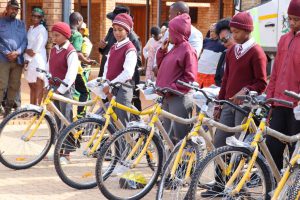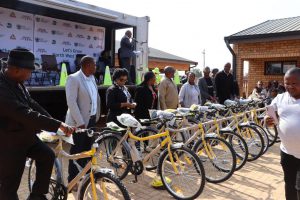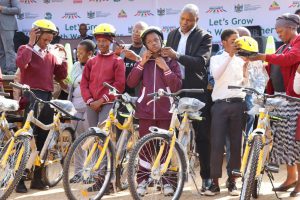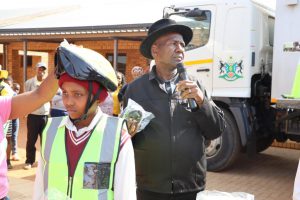
MEC for Community Safety and Transport Management Sello Lehari has made accessing school much easier for learners of Ramokonyane Secondary, who walk a distance between 3 and 5 kilometres daily to get to school.
The MEC has handed over 93 Shova Kalula bicycles for learners during the Ngaka Modiri Molema District rollout of the Provincial Government’s Accelerated Service Delivery Programme also known as Thuntsha Lerole.
The MEC encouraged learners not to be careless with the bicycles and to make use of them for schooling purposes only.
“By receiving this bicycle you also inherit the responsibility of taking good care of it, so that it lasts you for the entire duration of your schooling.
“We also encourage you to become responsible road users, understand the rules of the road, ensure that you comply accordingly and stay safe while you are using the bicycle”, said MEC Lehari while addressing the learners.
The National Department of Transport initiated the Shova Kalula project in 2001 with the aim of providing low cost mobility solutions to the learners in order to enable them to access educational facilities. Particularly learners in rural areas who do not meet scholar transport service requirements.
The MEC has handed over 93 Shova Kalula bicycles for learners during the Ngaka Modiri Molema District rollout of the Provincial Government’s Accelerated Service Delivery Programme also known as Thuntsha Lerole.
The MEC encouraged learners not to be careless with the bicycles and to make use of them for schooling purposes only.
“By receiving this bicycle you also inherit the responsibility of taking good care of it, so that it lasts you for the entire duration of your schooling.
“We also encourage you to become responsible road users, understand the rules of the road, ensure that you comply accordingly and stay safe while you are using the bicycle”, said MEC Lehari while addressing the learners.
The National Department of Transport initiated the Shova Kalula project in 2001 with the aim of providing low cost mobility solutions to the learners in order to enable them to access educational facilities. Particularly learners in rural areas who do not meet scholar transport service requirements.



